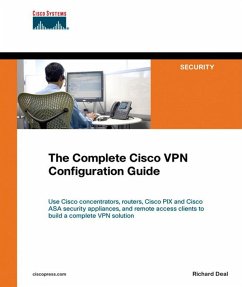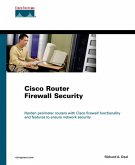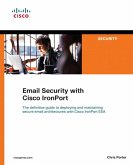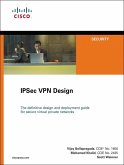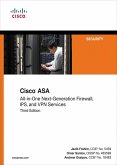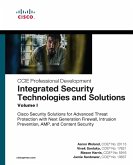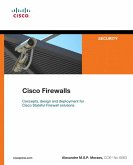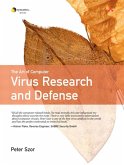Use Cisco concentrators, routers, Cisco PIX and Cisco ASA security appliances, and remote access clients to build a complete VPN solution
With increased use of Internet connectivity and less reliance on private WAN networks, virtual private networks (VPNs) provide a much-needed secure method of transferring critical information. As Cisco Systems® integrates security and access features into routers, firewalls, clients, and concentrators, its solutions become ever more accessible to companies with networks of all sizes. The Complete Cisco VPN Configuration Guide contains detailed explanations of all Cisco® VPN products, describing how to set up IPsec and Secure Sockets Layer (SSL) connections on any type of Cisco device, including concentrators, clients, routers, or Cisco PIX® and Cisco ASA security appliances. With copious configuration examples and troubleshooting scenarios, it offers clear information on VPN implementation designs.
Part I, "VPNs," introduces the topic of VPNs and discusses today's main technologies, including IPsec. It also spends an entire chapter on SSL VPNs, the newest VPN technology and one that Cisco has placed particular emphasis on since 2003. Part II, "Concentrators," provides detail on today's concentrator products and covers site-to-site and remote-access connection types with attention on IPsec and WebVPN. Part III covers the Cisco VPN Client versions 3.x and 4.x along with the Cisco3002 Hardware Client. Cisco IOS® routers are the topic of Part IV, covering scalable VPNs with Dynamic Multipoint VPN, router certificate authorities, and router remote access solutions. Part V explains Cisco PIX and Cisco ASA security appliances and their roles in VPN connectivity, including remote access and site-to-site connections. In Part VI, a case study shows how a VPN solution is best implemented in the real world using a variety of Cisco VPN products in a sample network.
This security book is part of the Cisco Press® Networking Technology Series. Security titles from Cisco Press help networking professionals secure critical data and resources, prevent and mitigate network attacks, and build end-to-end self-defending networks.
- A complete resource for understanding VPN components and VPN design issues
- Learn how to employ state-of-the-art VPN connection types and implement complex VPN configurations on Cisco devices, including routers, Cisco PIX and Cisco ASA security appliances, concentrators, and remote access clients
- Discover troubleshooting tips and techniques from real-world scenarios based on the author's vast field experience
- Filled with relevant configurations you can use immediately in your own network
With increased use of Internet connectivity and less reliance on private WAN networks, virtual private networks (VPNs) provide a much-needed secure method of transferring critical information. As Cisco Systems® integrates security and access features into routers, firewalls, clients, and concentrators, its solutions become ever more accessible to companies with networks of all sizes. The Complete Cisco VPN Configuration Guide contains detailed explanations of all Cisco® VPN products, describing how to set up IPsec and Secure Sockets Layer (SSL) connections on any type of Cisco device, including concentrators, clients, routers, or Cisco PIX® and Cisco ASA security appliances. With copious configuration examples and troubleshooting scenarios, it offers clear information on VPN implementation designs.
Part I, "VPNs," introduces the topic of VPNs and discusses today's main technologies, including IPsec. It also spends an entire chapter on SSL VPNs, the newest VPN technology and one that Cisco has placed particular emphasis on since 2003. Part II, "Concentrators," provides detail on today's concentrator products and covers site-to-site and remote-access connection types with attention on IPsec and WebVPN. Part III covers the Cisco VPN Client versions 3.x and 4.x along with the Cisco3002 Hardware Client. Cisco IOS® routers are the topic of Part IV, covering scalable VPNs with Dynamic Multipoint VPN, router certificate authorities, and router remote access solutions. Part V explains Cisco PIX and Cisco ASA security appliances and their roles in VPN connectivity, including remote access and site-to-site connections. In Part VI, a case study shows how a VPN solution is best implemented in the real world using a variety of Cisco VPN products in a sample network.
This security book is part of the Cisco Press® Networking Technology Series. Security titles from Cisco Press help networking professionals secure critical data and resources, prevent and mitigate network attacks, and build end-to-end self-defending networks.
Dieser Download kann aus rechtlichen Gründen nur mit Rechnungsadresse in A, B, BG, CY, CZ, D, DK, EW, E, FIN, F, GR, HR, H, IRL, I, LT, L, LR, M, NL, PL, P, R, S, SLO, SK ausgeliefert werden.

